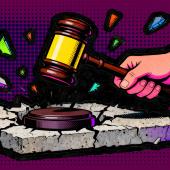
Since first being reported to the World Health Organization (WHO) China Country Office on December 31, 2019, COVID-19 has unfurled onto the world stage. It has disrupted commerce and trade, in addition to taking and threatening the lives of human beings around the globe.
About coronaviruses
Coronaviruses are a large family of viruses that can cause illness in animals or humans, and that the WHO has defined as a pneumonia of unknown cause. The US Centers for Disease Control (CDC) reports that human coronaviruses were originally identified in the mid-1960s. They can cause respiratory infections ranging from the common cold to more severe diseases such as Middle East Respiratory Syndrome (MERS) and Severe Acute Respiratory Syndrome (SARS).
The virus causing coronavirus disease 2019 (COVID-19) is the strain first identified in Wuhan, China. It is also referred to as the “novel” coronavirus because it was not previously identified. It is different from the coronaviruses that commonly circulate among humans and cause mild illness, like the common cold. As a result, evaluation and treatment for this strain is different than that for patients with a common coronavirus diagnosis.
Current litigation
Related litigation has already commenced. For example, the Allied Pilots Association asked a Dallas, Texas judge to block American Airlines flights to China, and instructed pilots to decline assignments on routes to China. The union also secured agreements with Delta and United Airlines to permit concerned pilots to decline routes to China.
In California, the US government abandoned plans to transport passengers from the Diamond Princess cruise ship from quarantine at a US Air Force base in Northern California to a state-owned center in the City of Costa Mesa. Costa Mesa is located in Orange County, a densely populated county, which is also home to Disneyland and Knott’s Berry Farm. The city sued to block the transfer of the patients, and received support from neighboring cities in its position.
Three proposed class action suits filed in New York and California allege that the manufacturers of hand sanitizers Purell and Germ-X exaggerate claims that their products can prevent the spread of certain viruses. In January the US Food and Drug Administration (FDA) issued a warning letter to Purell’s manufacturer, Gojo Industries, that its claims regarding Purell’s ability to protect against viruses such as Ebola, norovirus, and flu, amounted to marketing the product as a drug without FDA approval. While the FDA did not mention the coronavirus specifically, some of the allegations complain that these companies either expressly or by implication, suggested their products could combat the coronavirus.
Potential litigation claims
The litigation underway suggests that additional consumer and commercial disputes will likely follow due to the outbreak of COVID-19. While it is impossible to predict the nature and extent of any related litigation, claims could develop in the areas below.
- Commercial litigation disputes could range from premises-related claims to breach of contract claims over event cancellations; supply, acceptance or rejection of goods; representations; warranties; and force majeur provisions.
- The quarantine or restriction of infected or exposed persons could give rise to privacy or constitutional claims.
- Employers could see workers’ compensation claims alleging work-related exposure, or compensation-related claims arising from office closures and hours worked off the company premises.
- Personal injury claims could range from allegations of negligence to wrongful imprisonment by individuals quarantined or held in restricted locations.
- Consumers may file product liability claims against product and ingredient manufacturers for use or misuse of products not indicated to protect against the virus. For example, consumers are hoarding hand sanitizer even though the CDC advises that soap and water are the best mode of cleansing. Some individuals are concocting their own "hand sanitizer" and could later claim the ingredients in their home-made products were ineffective.
What companies can do
1. Think beyond COVID-19
While COVID-19 has commanded attention and triggered a lot of activity, companies are well advised to take a broader view in examining their agreements, policies, and general risk profile to avoid developing solutions that are too narrow and either create new problems later, or miss tangential risks that may arise.
2. Revisit contracts
Well-drafted contracts do not merely state the terms of an agreement, but provide a clear roadmap of the parties’ rights, obligations, and recourse when unexpected situations arise. Single source, supply, and similar agreements may include minimum volume purchase requirements and penalties for failure to meet those commitments. These contract provisions should be reviewed before a party takes action that could potentially give rise to a claim of breach.
Force majeur provisions generally exempt a party’s performance when natural disasters and other uncontrollable events occur. However, these provisions can vary greatly in the triggering events, notice requirements, exemptions, and impact of ongoing failure to perform on the long-term viability of the entire agreement. Given the global impact of the coronavirus outbreak, a party may be able to mitigate the impact of unfavorable provisions by proactively negotiating different terms with contract partners.
3. Review product packaging and warnings
While it may be impossible to prevent consumers from misusing certain products, manufacturers can review their instructions or warnings to determine whether updates are necessary.
4. Review guidance to employees
Some corporate policies can be rolled out, reviewed annually (if that often), and generally left undisturbed for years. Given the ongoing developments surrounding the coronavirus, employers may be better served by taking an iterative approach, reviewing and revising guidance on an ongoing basis as circumstances change.
5. Review compensation and attendance policies
Proactively determining if and to what extent existing attendance and pay policies may be impacted can allow employers to craft effective contingency plans if office or facility closures become necessary.
6. Monitor, monitor, monitor
Ongoing monitoring of global and local events, regulatory guidance and warnings can serve as a key factor for companies looking to stay abreast of and respond to ongoing developments. Adverse actions by regulatory agencies and ongoing litigation in other industries can also be instructive for prudent planning.
7. Stay calm
Keep everything in perspective; this is not the first epidemic mankind has weathered in recent years. The AIDS epidemic exploded onto the scene in 1981, killing an estimated 32 million people as of 2018. SARS was first reported in 2003, MERS in 2012, the Ebola virus in 2014, Zika fever in 2015, and the flu has proved more virulent in some years than in others. The emergence of this new virus may call for reviewing and improving existing corporate defenses, rather than completely building anew.




